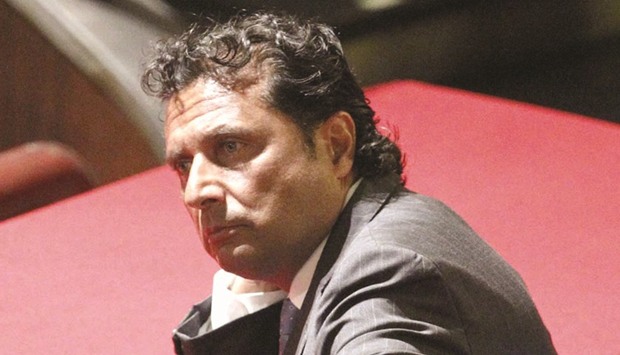Italian prosecutors called on the country’s highest court yesterday to drive home a guilty verdict against Francesco Schettino, the captain of the Costa Concordia cruise ship that sank in 2012 leaving 32 people dead.
Schettino (pictured), dubbed “Captain Coward” by the press for abandoning the stricken vessel during the disaster, was handed a jail term of 16 years and one month in 2015 in a ruling that was upheld last year by an appeals court.
Until a definitive verdict is reached, he will not spend any time behind bars.
The Court of Cassation in Rome could uphold the 16-year sentence or order the case to be reviewed by a fresh appeals court.
The judges are expected to begin their deliberations on May 12.
Schettino, 56, was convicted of multiple manslaughter, causing a maritime accident, and abandoning ship before all passengers and crew had been evacuated.
Prosecutors argue his recklessness was to blame for the fate of the giant ship, which struck underwater rocks off the Tuscan island of Giglio on the night of January 13, 2012, and toppled over.
“It was a shipwreck of such enormous size and characterised by such serious negligence and huge disregard for procedure” that Schettino deserves at least 16 years in jail, if not more, prosecutor Francesco Salzano said yesterday.
His biggest crime was “failing to alert the crew to the breach (when the ship hit the rocks) so they could launch the lifeboats and save the passengers”, he said.
Schettino did sound the alarm, but over an hour after impact.
Salzano said the captain, who claims he did not abandon ship but fell into a lifeboat as the ship rolled, “did not even maintain radio contact with his officers or stay informed about the fates of some 2,000 people” still trying to flee the sinking giant.
The violation of the ancient code of the sea which states a captain must be the last man off a sinking ship only accounted for one year of the sentence handed down by a three-judge panel in the Tuscan town of Grosseto.
With his slicked-back hair and macho swagger, the captain was portrayed during the first trial as a blackguard who was showing off for a blonde female guest when he performed a risky manoeuvre to “salute” the island which ended in tragedy.
The ship had been carrying 4,229 people, including 3,200 tourists from 70 countries, and crashed as many were sitting down to dinner.
The delayed and chaotic evacuation saw some desperately throw themselves overboard into the dark sea as lifeboats ran out.
Schettino’s lawyers had insisted that the accident and its deadly consequences were primarily due to organisational failings for which the ship’s owner, Costa Crociere, its Indonesian helmsman and the Italian coastguard should have shared the blame.
They also argued that it was not the collision, but rather the chaos that ensued due to the ship losing power that was the direct cause of the deaths.
Schettino could not be blamed for the mechanical failures, they said.
Costa Crociere avoided potential criminal charges by accepting partial responsibility and agreeing to pay a €1mn ($1.07mn) fine.
Five of its employees received non-custodial sentences after concluding plea bargains early in the investigation.

Italian prosecutors called on the country’s highest court yesterday to drive home a guilty verdict a
